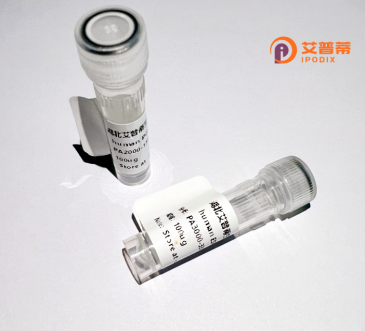
| 纯度 | >90%SDS-PAGE. |
| 种属 | Human |
| 靶点 | STK31 |
| Uniprot No | Q9BXU1 |
| 内毒素 | < 0.01EU/μg |
| 表达宿主 | E.coli |
| 表达区间 | 1-1019 aa |
| 活性数据 | MWVQGHSSRASATESVSFSGIVQMDEDTHYDKVEDVVGSHIEDAVTFWAQSINRNKDIMKIGCSLSEVCPHASSVLGNLDPNKIYGGLFSEDQCWYRCKVLKIISVEKCLVRYIDYGNTEILNRSDIVEIPLELQFSSVAKKYKLWGLHIPSDQEVTQFDQGTTFLGSLIFEKEIKMRIKATSEDGTVIAQAEYGSVDIGEEVLKKGFAEKCRLASRTDICEEKKLDPGQLVLRNLKSPIPLWGHRSNQSTFSRPKGHLSEKMTLDLKDENDAGNLITFPKESLAVGDFNLGSNVSLEKIKQDQKLIEENEKLKTEKDALLESYKALELKVEQIAQELQQEKAAAVDLTNHLEYTLKTYIDTRMKNLAAKMEILKEMRHVDISVRFGKDLSDAIQVLDEGCFTTPASLNGLEIIWAEYSLAQENIKTCEYVSEGNILIAQRNEMQQKLYMSVEDFILEVDESSLNKRLKTLQDLSVSLEAVYGQAKEGANSDEILKKFYDWKCDKREEFTSVRSETDASLHRLVAWFQRTLKVFDLSVEGSLISEDAMDNIDEILEKTESSVCKELEIALVDQGDADKEIISNTYSQVLQKIHSEERLIATVQAKYKDSIEFKKQLIEYLNKSPSVDHLLSIKKTLKSLKALLRWKLVEKSNLEESDDPDGSQIEKIKEEITQLRNNVFQEIYHEREEYEMLTSLAQKWFPELPLLHPEIGLLKYMNSGGLLTMSLERDLLDAEPMKELSSKRPLVRSEVNGQIILLKGYSVDVDTEAKVIERAATYHRAWREAEGDSGLLPLIFLFLCKSDPMAYLMVPYYPRANLNAVQANMPLNSEETLKVMKGVAQGLHTLHKADIIHGSLHQNNVFALNREQGIVGDFDFTKSVSQRASVNMMVGDLSLMSPELKMGKPASPGSDLYAYGCLLLWLSVQNQEFEINKDGIPKVDQFHLDDKVKSLLCSLICYRSSMTAEQVLNAECFLMPKEQSVPNPEKDTEYTLYKKEEEIKTENLDKCMEKTRNGEANFDC |
| 分子量 | 142.1 kDa |
| 蛋白标签 | GST-tag at N-terminal |
| 缓冲液 | PBS, pH7.4, containing 0.01% SKL, 1mM DTT, 5% Trehalose and Proclin300. |
| 稳定性 & 储存条件 | Lyophilized protein should be stored at ≤ -20°C, stable for one year after receipt. Reconstituted protein solution can be stored at 2-8°C for 2-7 days. Aliquots of reconstituted samples are stable at ≤ -20°C for 3 months. |
| 复溶 | Always centrifuge tubes before opening.Do not mix by vortex or pipetting. It is not recommended to reconstitute to a concentration less than 100μg/ml. Dissolve the lyophilized protein in distilled water. Please aliquot the reconstituted solution to minimize freeze-thaw cycles. |
以下是关于人STK31蛋白的3篇参考文献示例(注:部分文献信息为简化示例,实际引用需核实原始论文):
1. **文献名称**:*"STK31 maintains the undifferentiated state of mammalian male germ cells through PHF7 phosphorylation"*
**作者**:Zhang Y, et al.
**摘要**:研究发现STK31通过磷酸化表观调控因子PHF7.参与调控小鼠精原干细胞的自我更新与分化,提示其在生殖细胞发育中的关键作用。
2. **文献名称**:*"STK31 is a cell-cycle-regulated kinase that interacts with COP1 and regulates p53 activity"*
**作者**:Li H, et al.
**摘要**:该文揭示STK31在细胞周期中的表达波动,并通过与E3泛素连接酶COP1相互作用调控p53稳定性,影响DNA损伤应答与肿瘤发生。
3. **文献名称**:*"Proteomic analysis identifies STK31 as a novel cancer-testis antigen in colorectal cancer"*
**作者**:Wang X, et al.
**摘要**:通过蛋白质组学筛选发现STK31在结直肠癌组织中高表达且具有癌睾抗原特性,其沉默可抑制癌细胞增殖并增强化疗敏感性。
(注:以上内容为功能概括性示例,若需特定“重组蛋白”相关文献,建议进一步筛选涉及STK31重组表达、纯化或酶活分析的论文。)
Serine/threonine kinase 31 (STK31), also known as testis-derived aspartic protease (TDH) or sperm-specific protein kinase (SRPK), is a member of the protein kinase superfamily. Initially identified in germ cells, it is highly expressed in the testis and exhibits dynamic expression during spermatogenesis, suggesting a role in male germ cell development and fertility. Structurally, STK31 contains a conserved kinase domain but diverges from canonical kinases due to unique sequence variations in ATP-binding and catalytic motifs, leading to debates about its enzymatic activity. Some studies classify it as a "pseudo-kinase" with regulatory而非 catalytic functions.
Emerging evidence links STK31 to cancer biology, where it shows dual roles depending on cellular context. In colorectal, hepatocellular, and gastric cancers, STK31 is often upregulated and associated with tumor progression, proliferation, and metastasis, potentially through interactions with cell cycle regulators like Cyclin D1 or Wnt/β-catenin signaling. Paradoxically, its downregulation has been observed in certain malignancies, implying tissue-specific tumor-suppressive effects. Additionally, STK31 interacts with proteins involved in epigenetic regulation and RNA processing, hinting at broader roles in cellular homeostasis. Despite progress, its precise molecular mechanisms remain unclear, necessitating further research to clarify its kinase activity, downstream targets, and therapeutic potential in cancer and infertility.
×